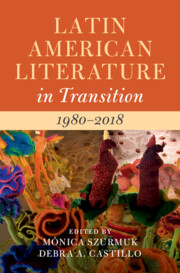Book contents
- Latin American Literature in Transition 1980–2018
- Latin American Literature in Transition
- Latin American Literature in Transition 1980–2018
- Copyright page
- Contents
- Contributors
- Acknowledgments
- Introduction
- Part I Security
- Part II New Genres
- Part III Mobilities
- Chapter 12 New Latinx/Chicanx Thought
- Chapter 13 The Boundless Dramas of Dancing Mulatas
- Chapter 14 Contemporary Stories of Deportation and Migration
- Chapter 15 The Language Shift of Literary Studies on Abiayala
- Chapter 16 South Asia and Latin America/Comparative Booms
- Part IV Positionalities
- Part V Latin American Literature in Global Markets
- Index
- References
Chapter 12 - New Latinx/Chicanx Thought
from Part III - Mobilities
Published online by Cambridge University Press: 24 November 2022
- Latin American Literature in Transition 1980–2018
- Latin American Literature in Transition
- Latin American Literature in Transition 1980–2018
- Copyright page
- Contents
- Contributors
- Acknowledgments
- Introduction
- Part I Security
- Part II New Genres
- Part III Mobilities
- Chapter 12 New Latinx/Chicanx Thought
- Chapter 13 The Boundless Dramas of Dancing Mulatas
- Chapter 14 Contemporary Stories of Deportation and Migration
- Chapter 15 The Language Shift of Literary Studies on Abiayala
- Chapter 16 South Asia and Latin America/Comparative Booms
- Part IV Positionalities
- Part V Latin American Literature in Global Markets
- Index
- References
Summary
This chapter explores new developments in Latinx/Chicanx literature and thought, focusing on three interrelated issues. The chapter first discusses the adoption of the term “Latinx.” Then, the author highlights recent work from previously underrepresented communities, including Afro- Latinx, Central American-American, and undocumented writers. The chapter concludes with an examination of innovation in the realm of genre, including memoir and young adult literature. Throughout, particular attention is given to the role of gender and sexuality alongside questions of race and nationality.
- Type
- Chapter
- Information
- Latin American Literature in Transition 1980–2018 , pp. 185 - 199Publisher: Cambridge University PressPrint publication year: 2022

